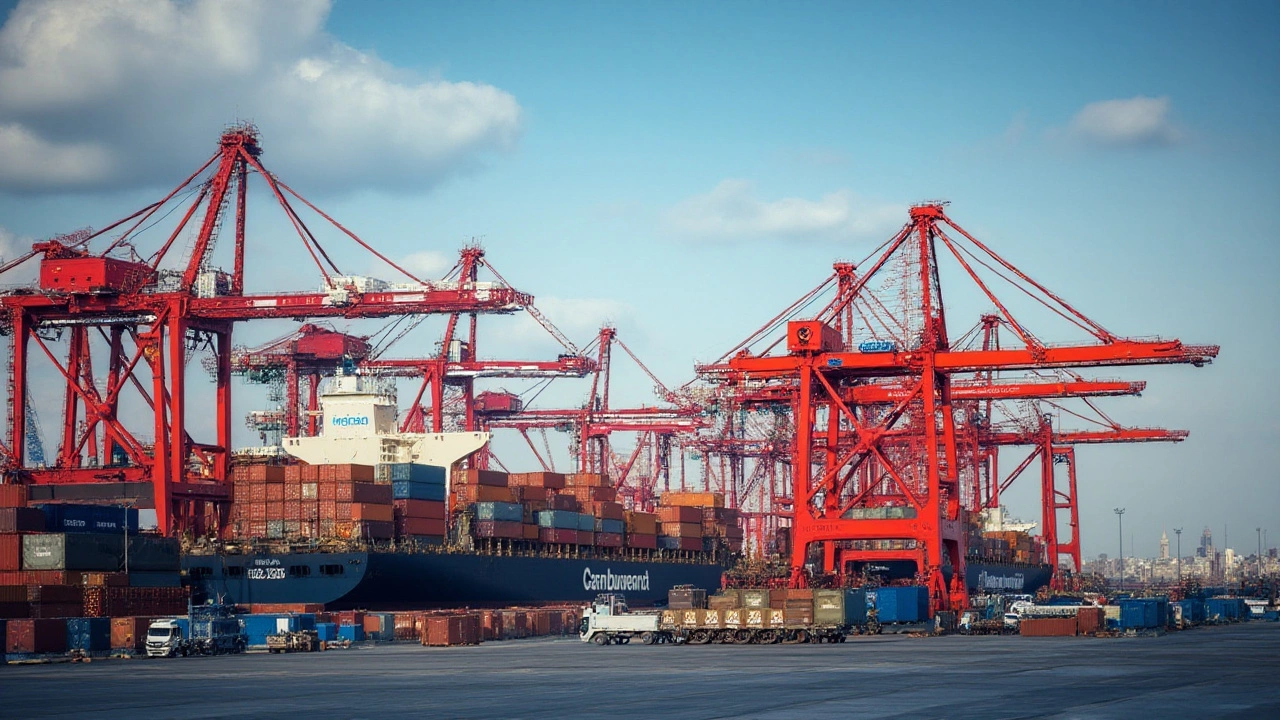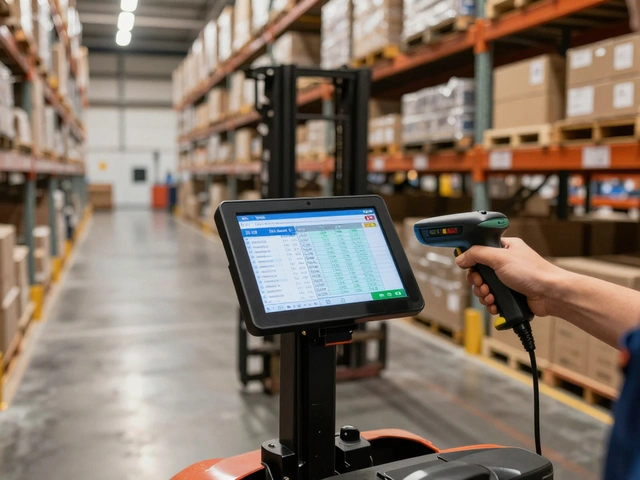In the bustling world of global trade, freight forwarding stands as the backbone of efficient logistics and supply chain management. This vital service ensures that goods are moved smoothly across international borders, connecting manufacturers, suppliers, and consumers from all corners of the globe. Yet, succeeding in this competitive arena requires a blend of knowledge, skill, and adaptability.
Freight forwarders play a critical role, serving as the crucial link between shippers and transportation services. By understanding the intricacies of this industry, one can position themselves to capitalize on opportunities and minimize challenges.
- Understanding Freight Forwarding
- Key Skills for Success
- Navigating Market Dynamics
- Leveraging Technology
- Trends Shaping the Future
Understanding Freight Forwarding
Freight forwarding is much more than just the transportation of goods from point A to point B. It's an intricate web of processes and expertise that ensures products arrive at their destination safely, efficiently, and in a timely manner. At its core, a freight forwarding service is a third-party logistics provider that facilitates the entire supply chain process on behalf of shippers. This involves everything from negotiating freight rates, arranging the necessary shipping routes, and preparing shipping and export documents to tracking freight in real-time and assessing freight-related risk management. The aim is to simplify complex transactions for clients while optimizing the logistics strategy to save both time and money. Among its various roles, freight forwarding requires staying up-to-date with international trade laws, taxation policies, and border controls—all fundamental elements to avoid delays and guarantee compliance with national and international legal frameworks.
One of the often underestimated challenges in this domain arises from the multiple parties involved in the shipping process. These parties include the shippers, consignees, carriers, and customs authorities, each with different expectations and operational modalities. Therefore, to succeed in freight forwarding, it is crucial to maintain transparent communication lines and foster strong partnerships across this network. Effective logistics management demands not only organizational skills but also a deep understanding of the market dynamics that steer shipping lanes and freight demands. An experienced freight forwarder will often have established relationships with shipping companies to negotiate better rates for their clients, suggesting that success in this field is frequently driven by industry rapport and insight. The ability to predict market shifts, such as seasonal demand surges or the impact of geopolitical events, further enhances a forwarder’s capacity to create contingency plans and maintain steady operations.
"Freight forwarding is the unsung hero of the global supply chain. Its intricacy lies in its capacity to turn logistical chaos into seamless order," noted by John Doe, a renowned logistics director.
Moreover, the world is experiencing rapid digital transformation, which is rapidly reshaping the logistics and supply chain landscape. Digital tools, from cloud-based tracking software to sophisticated data analytics platforms, are enhancing operational effectiveness, providing visibility into every facet of the freight movement. Companies that aim to excel in freight forwarding must integrate these technological advancements to provide enhanced service offerings to their clients. This entails not just adopting new technologies but also training personnel to use these technologies proficiently. Automation, through AI and machine learning, has already begun to streamline redundant tasks and improve decision-making processes in logistics operations.
Furthermore, in the current era where sustainability is becoming a consumer demand, freight forwarding companies are also focusing on reducing their carbon footprints. Implementing green logistics initiatives, optimizing routes to lower fuel consumption, and collaborating with environment-friendly carriers are initiatives that are gaining traction. It's about ensuring environmentally viable shipping while still catering to the efficiency required in supply chain dynamics. To illustrate the wide spectrum of freight forwarding, consider the various services commonly provided by forwarders, which often include but are not limited to: warehousing, cargo insurance, packaging and labeling, and inland transportation. Each of these services is pivotal in creating a holistic shipping solution, as they cater to different aspects of the supply chain process, addressing both the needs of goods protection and transport efficiency.
A 2019 industry report by XYZ Research indicated that the global freight forwarding market size was valued at approximately USD 150 billion, with projections suggesting significant growth driven by increasing international trade volumes. These figures emphasize the sector's robust trajectory and the opportunities that exist for those willing to adapt to its fast-paced environment. However, to remain competitive, freight forwarding operators must be agile and remain receptive to constant changes in both regulatory landscapes and consumer demands. Mastery of freight forwarding is not only about understanding current market trends but also about anticipating potential disruptions and opportunities to leverage them for growth.
Key Skills for Success
Achieving success in the freight forwarding industry is not merely about understanding logistics; it’s about mastering a suite of skills that enable one to navigate the complexities of global trade with ease and confidence. A successful freight forwarder must first possess excellent communication skills, as they will interact with diverse stakeholders ranging from shippers, carriers, and customs officials. This ability to communicate clearly ensures that all parties are aligned, reducing the risk of costly misunderstandings.
Alongside communication, organizational skills are paramount. Freight forwarding involves scheduling, tracking, and updating numerous shipments simultaneously, and a freight forwarder must maintain a meticulous approach to managing these elements. By keeping detailed records and efficiently juggling multiple tasks, one can ensure deliveries are timely and disruptions are minimized.
Problem-solving skills are another crucial aspect, as unexpected challenges are inevitable in this sector. Whether dealing with adverse weather conditions or sudden regulatory changes, the ability to think quickly and devise creative solutions can prevent significant delays or financial losses. In this ever-changing environment, adaptability is also important. Regulations and market demands are constantly evolving, and freight forwarders must stay informed and adjust their strategies accordingly to maintain competitiveness.
As technology plays an increasingly vital role in logistics, having a level of tech-savviness is beneficial. Systems for tracking shipments, managing documentation, and analyzing logistics data are tools a modern freight forwarder must be comfortable with. Embracing technology not only streamlines operations but also enhances service offerings to clients.
"The capacity to manage sudden changes and maintain service quality during disruptions is what sets leading freight forwarders apart," says John, a renowned logistics consultant.
Furthermore, understanding international trade laws and customs procedures is crucial. Each country has its own rules and regulations, and compliance is non-negotiable. Freight forwarders must be versed in these protocols, as non-compliance can lead to costly fines and shipping delays. By thoroughly understanding these legal requirements, a forwarder safeguards their agency and client’s reputational and financial interests.
Let's take a look at some fascinating statistics that underline the importance of these skills. In a survey conducted by the International Freight Association, nearly 75% of freight forwarding companies reported that obtaining accurate real-time data was their biggest technological challenge. The same survey highlighted that companies emphasizing skills like adaptability and problem-solving saw a 32% increase in operational efficiency.

Navigating Market Dynamics
Delving into the intricate web of market dynamics is akin to embarking on an adventure through a rapidly shifting landscape. For those involved in freight forwarding, understanding and adapting to these changes is not merely advantageous but essential to thriving in the competitive logistics sector. The market is in a constant state of flux, influenced by a myriad of factors such as geopolitical shifts, trade policies, economic cycles, and consumer demand patterns. Each of these elements plays a role in shaping the decisions and strategies of freight forwarders who are tasked with ensuring that goods traverse borders seamlessly and cost-effectively.
The globalized economy means that changes in one region can ripple across the world, impacting supply chains at an unprecedented speed. Consider the implications of a sudden regulatory change in a major port or the effect of tariffs imposed between trading nations. These are not hypothetical scenarios but realities that require immediate attention and swift adaptation. The agility to recalibrate strategies swiftly in response to such unforeseen disruptions is what sets successful freight forwarders apart.
A
recent industry report by Logistics Management noted, "Adaptability and foresight in anticipating market trends are the hallmarks of leading freight forwarding firms."It is not just about reacting to situations but also about forecasting trends, such as the rise in e-commerce or the shift towards greener logistics solutions. Being proactive involves a deep understanding of market signals and leveraging data analytics to predict shifts before they occur.
A critical tool in navigating these dynamics is the effective use of technology. Modern freight forwarding is increasingly technology-driven, utilizing advanced tracking systems, AI insights, and blockchain to enhance transparency and efficiency. Integrating these technologies into daily operations not only optimizes the logistics chain but also provides a competitive edge. Freight forwarders who invest in cutting-edge solutions find themselves better equipped to handle market volatility and improve service offerings significantly.
Moreover, building robust relationships with stakeholders in the supply chain ecosystem is indispensable. This network acts as a support system, offering insights and alliances that are crucial when navigating turbulent markets. By fostering partnerships with carriers, customs officials, and logistics providers, forwarders can negotiate better terms, gain access to new markets, and enhance their operational resilience.
To stay ahead, it is important for freight forwarders to keep abreast of industry developments and continuously refine their knowledge and skills. Regular participation in industry conferences, webinars, and seminars keeps players informed and connected. A relentless pursuit of knowledge ensures they are not just part of the flow but are ahead of it, steering themselves toward success.
Here's an outlook into the finer points of navigating these dynamics in practice:
- Anticipate governmental policy shifts through regular updates with trade boards.
- Utilize comprehensive market analysis tools which predict economic shifts preemptively.
- Embrace innovation by investing in eco-friendly and tech-driven logistics solutions.
- Foster strategic partnerships to create a resilient supply chain network.
In the realm of freight forwarding, understanding and navigating market dynamics could be likened to mastering the art of reading winds and currents at sea—a skill that ensures a smooth and efficient voyage in the vast ocean of global trade.
Leveraging Technology
In the realm of freight forwarding, technology plays a pivotal role in streamlining operations and enhancing efficiency. With the rapid pace of innovation, industry players are tapping into cutting-edge tech solutions to stay competitive and meet the ever-changing demands of the global market. One of the most significant technological advancements in this field is the rise of digital freight platforms. These platforms simplify the complex logistics involved in freight forwarding by offering a centralized digital environment where all stakeholders can connect seamlessly. While traditional methods relied heavily on phone calls and emails, these digital solutions have transformed communication, providing real-time updates and faster responses.
Another essential technological tool making waves in freight forwarding is automation. Automating routine tasks, such as booking shipments and generating invoices, reduces the time spent on manual paperwork and minimizes the chances of human error. This efficiency boost ensures that companies can handle more significant volumes of shipments without compromising on quality. Furthermore, warehouse automation has become a game-changer for freight forwarders, integrating technologies like robotic pickers and automated storage systems to accelerate operations and reduce labor costs.
Moreover, the impact of the Internet of Things (IoT) cannot be overlooked. IoT devices enable the tracking of shipments in real-time, providing valuable insights into the condition and location of goods as they move through various stages of the supply chain. This enhanced visibility not only enhances security but also aids in predictive maintenance, allowing companies to address potential issues before they escalate into significant problems. Customers appreciate the transparency, as it gives them peace of mind about the safety and timely delivery of their products.
Utilizing Data Analytics
The logistics industry has increasingly begun to harness data analytics to drive informed decision-making. By collecting and analyzing large volumes of data, freight forwarders can optimize routes, reduce fuel consumption, and cut down on operational costs. For example, analyzing historical data can reveal patterns that help predict peak seasons, enabling companies to allocate resources more efficiently. Data analytics also aid in identifying underperforming segments of the operation, providing the opportunity for strategic improvements.
"In today’s competitive environment, those who leverage technology to drive efficiency and generate insights are leading the way," says a leading logistics technology expert.
The integration of Artificial Intelligence (AI) into freight forwarding technology is another development with significant potential. AI can enhance the predictive accuracy of demand forecasting, which is vital for managing inventory levels and avoiding stockouts or overstock situations. Additionally, AI-driven chatbots are transforming customer interactions, providing swift responses to inquiries and enhancing customer satisfaction. As these technologies mature, their application will become increasingly indispensable in maintaining an edge in the market.

Trends Shaping the Future
In the ever-evolving realm of freight forwarding, staying ahead of emerging trends is not just beneficial—it's imperative. One of the paramount trends influencing the future is the digital transformation of logistics operations. With the advent of technologies like blockchain and IoT, the traditional ways of managing shipments are being revolutionized. These technologies promise increased transparency and efficiency. Blockchain, for instance, offers secure transaction records that can prevent fraud and enhance trust among international partners, which is a cornerstone of modern logistics.
The rise of e-commerce has also significantly altered the landscape. As online shopping continues to grow exponentially, the demand for swift and reliable delivery services intensifies. This trend has bolstered the need for advanced logistics solutions, including AI-driven forecasting tools that predict trends and optimize shipment paths. The ability to analyze big data and extract actionable insights can give forwarders a unique edge in forecasting demand and managing supply chains more effectively.
Another significant development is the shift towards sustainable practices. With growing environmental awareness, stakeholders are prioritizing eco-friendly initiatives. Many organizations are investing in greener transportation modes to reduce carbon footprints. The implementation of electric and hybrid vehicles for short hauls, along with a focus on consolidating shipments to minimize trips, are becoming industry standards. Moreover, these changes not only help the planet but often result in cost savings, making them doubly appealing.
Regulatory changes, too, play a pivotal role in shaping the future. As governments worldwide adopt stricter guidelines around shipping logistics, companies must remain agile and proactive in compliance. Navigating these complex regulations can become a cumbersome task without the right tools and knowledge base. As one expert in the field commented, "Staying informed is not just about following the law; it enables companies to identify opportunities where others see barriers."
The global pandemic highlighted the importance of a resilient supply chain, pushing companies to reevaluate and strengthen their operations. This is likely to increase investments in risk management strategies and adaptive logistical networks that can withstand disruptions. Among the promising solutions are decentralized supply chains, which offer more flexibility and prevent the entire system from collapsing due to localized issues.
Lastly, the rise of the gig economy has started to interlace with freight forwarding. With many firms turning towards freelance and on-demand services, the landscape is changing from rigid, long-term contracts to more flexible and responsive agreements. This trend taps into the need for scalability and adaptability, allowing companies to meet fluctuating demands without overcommitting resources. Adapting quickly to these trends is not just about survival; it's about seizing the opportunity for growth in a rapidly shifting world.





